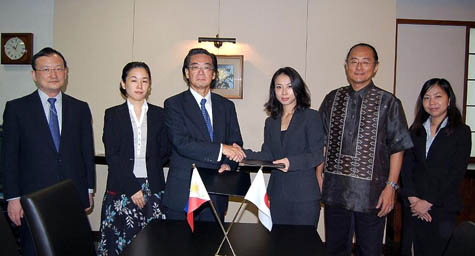
( Japanese Ambassador Makoto Katsura congratulates Ms. Maho Suzuki who represented JATA President Isao Osada during the signing ceremony for the Tuberculosis Control Project in Socio-economically Underprivileged Urban Area in Metro Manila held at the Embassy of Japan) |
Japanese Ambassador to the Philippines Makoto Katsura and Ms. Maho Suzuki, representing Dr. Isao Osada, President of the Japan Anti-Tuberculosis Association (JATA), a Japanese NGO, signed a grant contract for the Tuberculosis Control Project in Socio-economically Underprivileged Urban Area in Metro Manila, Philippines “Stop TB para sa Lahat”, at the Embassy of Japan on 27 May 2010. The contract signing marked the appropriation to this project of US $ 350,223 ( approximately Php 16.1 million ) from the “Grant Assistance for Japanese NGO Projects” under Japan's Official Development Assistance (ODA). Around 440,000 urban low-income residents of Payatas in Quezon City and Tondo, Manila will benefit from this project.
The Philippines remains to be highly burdened by tuberculosis (TB) and one of the worst twenty-two countries hampered by this life-threatening communicable disease. It also ranks fourth in high TB incidence in the Western Pacific Region, the WHO said in 2008.
The fight against this disease continues to be a major global health concern. The Direct Observed Treatment, Short Course (DOTS) is the core strategy of TB therapy and the Philippines has already acquir ed the WHO standard for this treatment. The prevalence rate of TB, however, continues to be relatively high especially in urban unhygienic or slum areas. These are attributable to problems such as inaccessibility for health workers to enter these areas, insufficient facilities for TB treatment, discontinued treatment due to frequent relocation of patients, among others.
In the last phases in 2008 and 2009, the Research Institute for Tuberculosis/JATA , Philippines, inc. has assisted in the urban unhygienic or slum areas, by building the network with Philippine NGOs acting in the area. Through the network, they have shared the information about the patients, have educated the people in the area and have trained the health workers in the area. In these past two years, they had trained 107 doctors and paramedics, and 185 volunteers who treat TB patients. In addition, they held the Lung Month event (August 2009), which was attended by 520 local residents including the Mayor of Manila City, and also World TB Day (March 2010), which were participated by 320 local residents. Furthermore, they educated them with proper information on TB.
In this phase (2010), they will continue training doctors and paramedics, assist the Philippine NGO partners acting in the area to introduce ETR (Electronic Tuberculosis Register) to effectively share useful patient information. Furthermore they will strengthen networking with the Philippine NGO partners which they have built during the past two years, as well as invite other new Philippine NGOs to join the network to expand the network. In addition, they will educate the local residents through events such as World TB Day.
T his last year, it will continue the project that aims to improve TB control through quality assurance of TB DOTS, by training and tracking the patients, especially prioritizing the area which has not achieved the goal(Success Rate 85%, Defaulter Rate 10%).
T he Grant Assistance for Japanese NGO Projects was launched in 2002 to enhance cooperation between the Government of Japan and NGOs in the implementation of ODA to promote effective and efficient aid for developing countries. In the Philippines, 18 projects in various sectors worth approximately Php 70 million have been funded by this program.
Japanese Version


